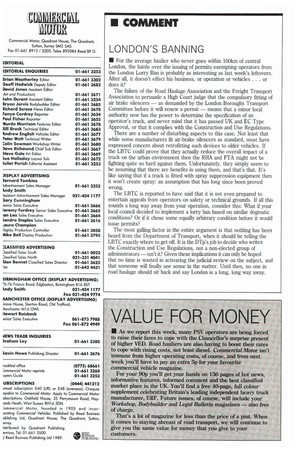LONDON'S BANNING
Page 5

If you've noticed an error in this article please click here to report it so we can fix it.
• For the average haulier who never goes within 100km of central London, the battle over the issuing of permits exempting operators from the London Lorry Ban is probably as interesting as last week's leftovers. After all, it doesn't effect his business, or operation or vehicles . . or does it?
The failure of the Road Haulage Association and the Freight Transport Association to persuade a High Court judge that the compulsory fitting of air brake silencers — as demanded by the London Boroughs Transport Committee before it will renew a permit — means that a minor local authority now has the power to determine the specification of an operator's truck, and never mind that it has passed UK and EC Type Approval, or that it complies with the Construction and Use Regulations.
There are a number of disturbing aspects to this case. Not least that while some manufacturers fit air-brake silencers as standard, most have expressed concern about retrofitting such devices to older vehicles. If the LBTC could prove that they actually reduce the overall impact of a truck on the urban environment then the RHA and FTA might not be fighting quite so hard against them. Unfortunately, they simply seem to be assuming that there are benefits in using them, and that's that. It's like saying that if a truck is fitted with spray suppression equipment then it won't create spray: an assumption that has long since been proved wrong.
The LBTC is reported to have said that it is not even prepared to entertain appeals from operators on safety or technical grounds. If all this sounds a long way away from your operation, consider this: What if your local council decided to implement a lorry ban based on similar dogmatic conditions? Or if it chose some equally arbitrary condition before it would issue permits?
The most galling factor in the entire argument is that nothing has been heard from the Department of Transport, when it should be telling the LBTC exactly where to get off. It is the DTp's job to decide who writes the Construction and Use Regulations, not a non-elected group of administrators — isn't it? Given these implications it can only be hoped that no time is wasted in activating the judicial review on the subject, and that someone will finally see sense in the matter. Until then, no one in road haulage should sit back and say London is a long, long way away.




















































































































































